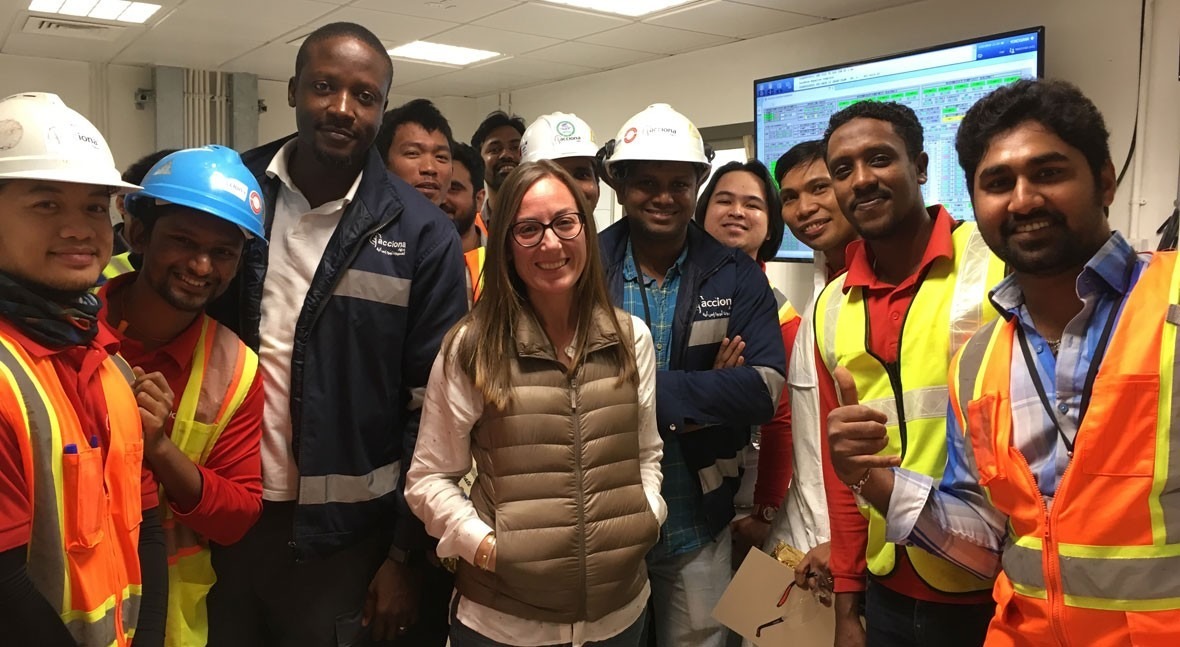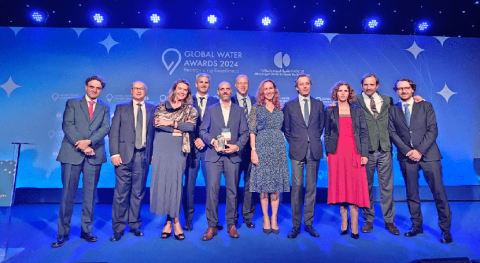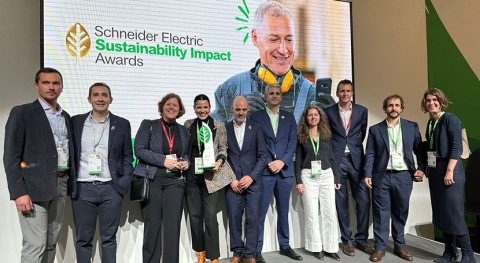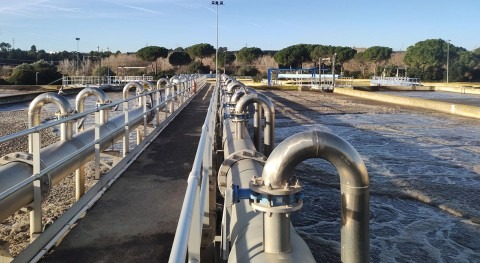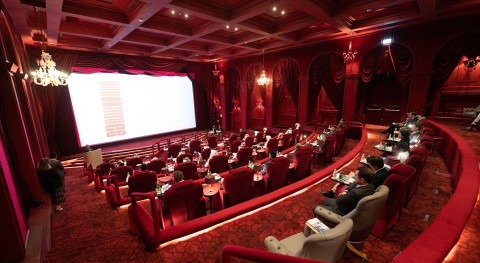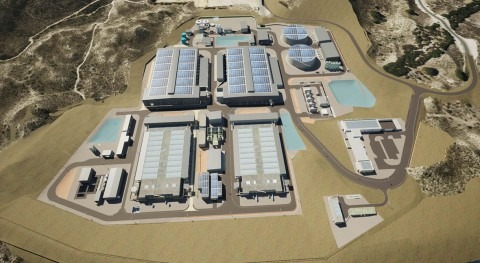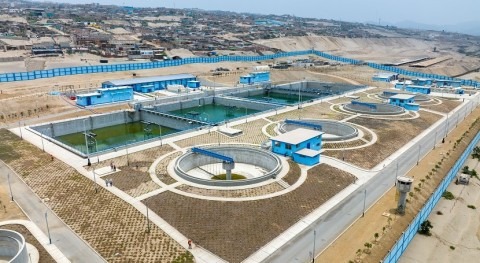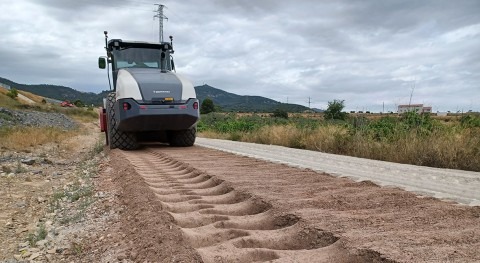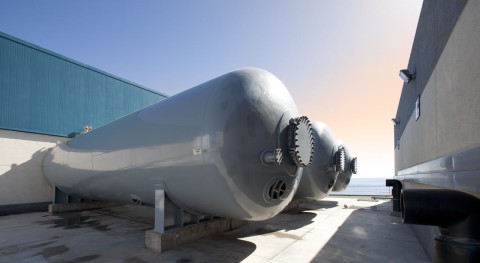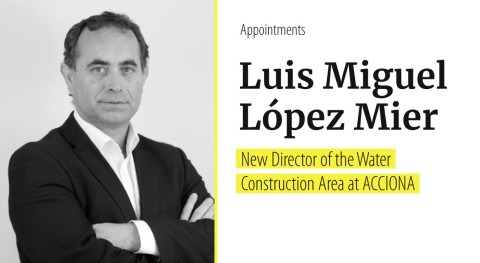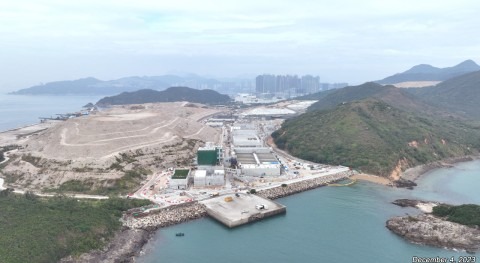Maribel Fornies, Operations Manager at the Umm Al Houl desalination plant of Acciona Agua in Qatar, tells us in 'Women and Water' about her experience as a woman in a Middle East country, where the differences between men and women are more visible.
Question: First, we would like to know in detail about your career path up to your current position.
Answer: After concluding a Chemical Engineering degree at the University of Barcelona, I started to work for Acciona Agua, in the R&D Department, that was 10 years ago!
For the first three years I worked on the design and construction of a pilot plant for Dow Water & Process Solutions; I consider that to be my first international project. My interest in new experiences made me change teams and join the department of International Construction, where I would spend one and a half years at the Beckton desalination plant, in the heart of London. Without a doubt, it was an excellent opportunity for my professional development as a process engineer. The next step took me a little farther, to Australia. I worked at the Mundaring drinking water treatment plant (Perth) for almost four years; at the end of that period I was the Head of Operations and Water Quality. I wanted to continue to grow and reach new challenges, so I ended up in a small Gulf State, Qatar, where I have been working for a little over a year at the Umm Al Houl desalination project, where currently I am the Head of Operations.
The more we can lessen the divide between careers known as 'women careers' and 'men careers', the more we will be able to minimise gender differences too
Q: In the water sector we continue to see an important gender gap. Why do you think this is?
A: I remember that when I attended university, in my engineering courses only 25% of the students were female. That per cent is slowly increasing, something I am very happy about.
If we look at the water sector, we can see that the demand for engineers is very high, so logically men still outweigh women in the sector. As the next generation takes over, and the more we can lessen the divide between careers known as 'women careers' and 'men careers', the more we will be able to minimise gender differences, both in engineering faculties and in companies.

From my current position as Operations Manager I can say that, even though I am surrounded every day by a large number of male workers, whether colleagues, outsourced staff or clients, the role and the tasks can be carried out with the same success and quality regardless of gender.
Qatar is a traditional country with deep cultural roots, where religion plays an important role, and where men and women have distinct roles both in the family and in the workplace. However, businessmen in Qatar look for a job well done and well organised, that provides certainty to their investments, and once they obtain it and accept that the work has been done by a woman, they value it and can even appreciate it.
I remember that when I attended university, in my engineering courses only 25% of the students were female
Without a doubt, I consider the gender gap to be just a cultural issue, and in societies such as those in the Middle East, the differences are even greater. It is our duty to work in order to change customs, always with respect.
Q: Does Acciona have any programmes and/or tools to foster equality, aimed to bridge the gender gap?
A: Acciona has had an Equality Plan in place for a few years, with the purpose of minimising the gender gap, offering equal opportunities and recognising personal worth and merits regardless of gender, age and race.
Personally, Acciona Agua has given me the opportunity to get to know and work in different countries and cultures, working at different company departments, and also the opportunity to grow professionally and as an individual, in different positions and assuming greater responsibilities and leadership roles.
We could say that the R&D department is one of the company areas with most women on staff, while the departments of Construction and Commissioning, with on site tasks requiring greater physical effort, are traditionally male areas. My career development within Acciona Agua can be seen as a clear example of a company that fosters equality, opening the doors to work in any department and discipline regardless of gender.
A key point is making our own colleagues proud of us; they should not see us as a challenge, but as one more member of the team
Another initiative of Acciona Agua, jointly with Australian companies, and to which I was honoured to be invited in 2016, is the celebration of International Women's Day. Seminars are organised with the participation of women leaders from different sectors, supporting and encouraging women in senior management positions.
Q: What other measures (aside from those contemplated by companies) would be, in your view, effective to reach parity in the water sector?
A: I encourage companies and current senior executives to provide opportunities to women professionals. A key point is making our own colleagues proud of us; they should not see us as a challenge, but as one more member of the team, to which we contribute our worth and perseverance.

The presence of females in water sector positions in the Middle East will not change society, but I am sure it will help to transform it.
Cultural factors are difficult to change, so we have to work, be constant at it and win merits. in Qatar, a man does not shake a woman's hand, it is frowned upon. I recognise that at the beginning it was hard for me to accept; however, after having done a good job and demonstrating my abilities, the Qatari CEO now wants to shake my hand as a greeting instead of giving me a nod. I am sure that the next time he encounters a woman in a position in the water sector, he will give her a chance.
It is important to instil new values, not only in the coming generations, but also in the company itself
Q: Now let us talk about your experience, what difficulties have you faced in your career because you are a woman?
A: I have probably faced more difficulties in Qatar. I remember the first day I arrived to the Umm Al Houl project. When I entered the construction site, a huge panel showed the logo of the companies participating in the project, as well as the number of workers at the site that day: 15,572 people. I will never forget the number. I was very surprised when I realised that of these 15,572, only a few were women, less than a handful I would say.
More than difficulties, I would say I felt powerless and disappointed. When you participate in meetings with the client where you are the only woman out of 20 people around the table, and you can feel the mistrust of some of them, who doubt your skills and your worth, you have to make an effort and demonstrate what you are capable of. You find the same mistrust in your own team, but with time they accept you and are even proud to work for you.
Throughout this year in Qatar, I had to assume the responsibilities and the role of some colleagues who had to leave their job due to illness and/or voluntary leave in two occasions. When you are in a situation like that, you have to take advantage of the opportunity, particularly if you are a determined woman, because it is not easy to reach these positions.
Although the gender gap is getting smaller, there is still a long way to go before wage differences disappear when women and men do the same job.
I encourage companies and current senior executives to provide opportunities to women professionals
Q: Are there any other pressing challenges that you think need to be addressed in the sector?
A: Our society is full of prejudice and stereotypes, which feed back into gender differences. Every woman should look for and drive change.
Companies should take advantage of their staff's potential, give them visibility, without wasting a single drop of talent, in order to increase the competitiveness and cost-effectiveness of the company as a whole. It is a matter of breaking barriers, remove constraints and catalyse women's worth in leadership positions.
It is important to instil new values, not only in the coming generations, but also in the company itself, so that our male colleagues are the first ones to collaborate to make this change possible.
Q: Conversely, what do you think are the main achievements in the sector?
A: A role model for me in the water sector is Sue Murphy, CEO of Water Corporation in Western Australia. I met her when I was living in Perth, working at the Mundaring drinking water treatment plant. She is a charming woman that has made a place for herself in the upper echelons of the water sector. She is an example that confirms that, more so than what you achieve, what really matters is how you convey it, and it is something that I try to apply in my daily work, surrounded by men. She once said that water was already a women's business, since in the third world it is a women's task to bring water home.
Therefore, let us keep in mind success stories such as the one of Sue Murphy and let us put together our efforts with hers.


